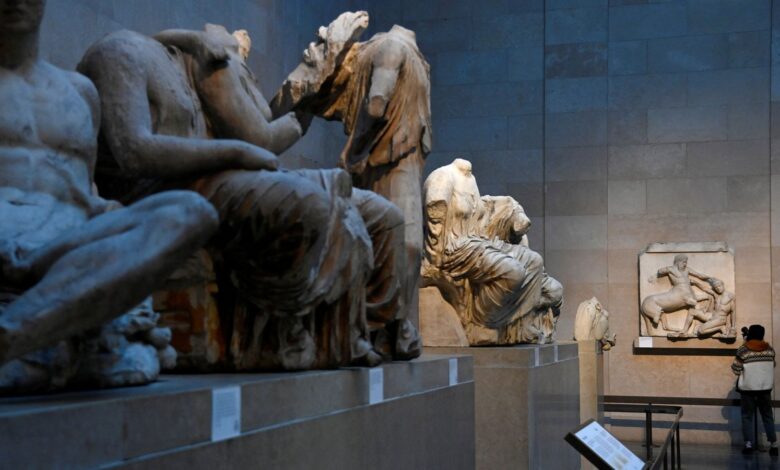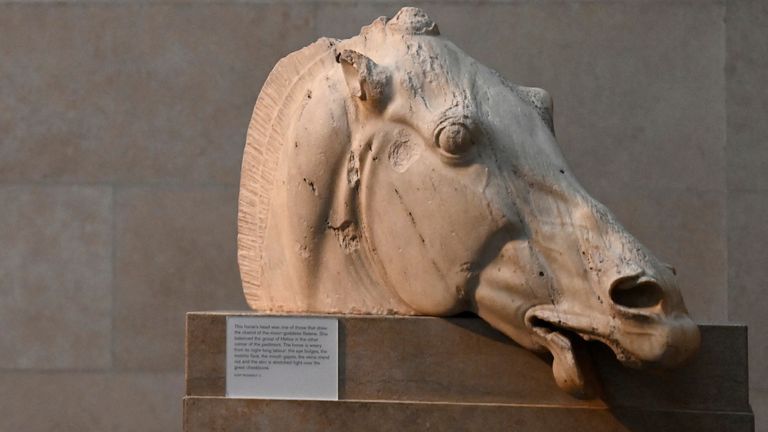Elgin Marbles: British Museum and Greek PM had ‘private meetings’ ahead of visit, source says

The return of the Elgin Marbles has been discussed in what was described to Sky News as “private meetings”.
A senior governmental source said the Greek Prime Minister Kyriakos Mitsotakis and foreign minister Giorgos Gerapetritis had up to three “private meetings” with trustees of the British Museum and chair George Osborne about returning the Parthenon Sculptures – also known as the Elgin Marbles – this year.
The news comes as Mr Mitsotakis is due to meet with Prime Minister Sir Keir Starmer on Tuesday – where it is expected they will discuss the sculptures.
Former prime minister Rishi Sunak cancelled a meeting with Mr Mitsotakis in 2023 and believed the collection should remain in the British Museum.
Sir Keir is thought to be more favourable to a return of the sculptures than his predecessor.
A source close to the prime minister was quoted in the Financial Times saying: “We are open to whatever is agreed. It’s right to say there is no strong view on what should happen.”
The Parthenon Sculptures are part of a frieze that decorated the ancient Parthenon temple at the Acropolis in Athens.
British diplomat Lord Elgin removed the sculptures in the early 19th century while he was the ambassador to the Ottoman Empire, which then ruled Greece.
Lord Elgin claimed he had been given permission by the Ottoman Empire for the transfer of the sculptures and sold them to the UK government in 1816 before the marbles were passed into the trusteeship of the British Museum.
Turkey believes that permission was never given, and representative Dr Zeynep Boz supported Greece publicly in June at the United Nations Return & Restitution Intergovernmental Committee (ICPRCP).
Read more:
What are the Elgin Marbles and how did they end up in Britain?
Dr Boz, who is head of the department for combatting illicit trafficking for Turkey’s culture ministry, told Sky News they have access to the entire Ottoman archive and there is no proof of the permission form, known as a firman.
“There is no firman, only an Italian text referred to as a translation of the firman, but without the original document, we cannot authenticate it,” she said.
“Despite extensive archival research, no such firman has been found. It is even difficult to call this document a translation when the original is not available.”
Dr Mario Trabucco della Torretta, classical archaeologist and longtime campaigner for keeping the Elgin Marbles in London, disagrees.
He told Sky News: “Overall, there is way more evidence for the permission than there will ever be for the fiction of the ‘theft’ of the marbles.
“The fact that we don’t have the original anymore is of no consequence. The original, seen by John Galt in Athens, was destroyed by the Greeks when they set fire to the archives of the Voivode in 1821.”
The British Museum Act 1963 prevents treasures from being legally given away by the British Museum. Meanwhile, the Department of Media Culture and Sport says it has “no plans to change existing government policy on restitution” and that it is up to the trustees of the museum to decide.
Read more from Sky News:
President Joe Biden issues pardon for son
Georgian protests spreading – reports
The British Museum declined to comment about the informal meetings but said that they continue to talk about a Parthenon Partnership with the Greek government.
This could mean that a loan agreement between the British Museum and the Greek government could be in the pipeline – paving the way for one of the most significant cultural monuments in the world to be returned to Greece more than 200 years after they were shipped out of the country.
However, for that to happen, Greece would have to agree to be loaned an artefact it believes it rightfully owns, so challenges remain.





